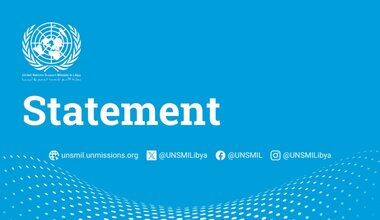Sixty-five youth from eastern Libya join DSRSG Koury in UN consultations on the upcoming roadmap
TRIPOLI – Sixty-five youth from cities across eastern Libya joined Deputy Special Representative of the Secretary-General for Libya, Political Affairs, Stephanie Koury, in an online consultation last Thursday, about the challenges they face and their ideas on the Advisory Committee's proposals.
The session was held as part of UNSMIL's series of public consultations with all Libyans. Participants praised the Advisory Committee's proposals, believing it had reached a set of recommendations that aligned with the aspirations of most Libyans. However, they expressed their fears that spoilers would continue to obstruct any roadmap which does not align with their interests. "The current political bodies serve only their interests. They possess weapons and protection, and profit from this," one female participant said.
Participants' opinions varied among the options presented by the Advisory Committee. Some considered the fourth proposal, which calls for the formation of a constitutional assembly to replace existing institutions, to be the preferred solution to end the current deadlock. Others believed it would return the Libyan political scene to square one and prolong the transitional phases.
"Moving toward presidential and legislative elections represents a natural progression from the desire and will of the more than two million Libyans who registered for the 2021 elections and were denied a vote," said one participant from Derna.
Others believed that establishing a constitution first would be a priority before discussing any elections, to prevent a repetition of previous experiences. All participants agreed on the necessity of involving youth in any political process.
"Youth are not represented in any political body currently," one female participant from Benghazi said, adding, "the House of Representatives is supposed to be the best representative of youth and listen to their voices, but the reality is different."
In response to a question from DSRSG Koury about youth representation in the political process, participants differed on which bodies would best represent youth. Some considered political parties to be a tool for youth political participation, while others believed that political parties in Libya do not enjoy widespread acceptance among society, unlike civil society. Some participants pointed to the Supreme Youth Council, a proposed institution still under consideration by the House of Representatives.
DSRSG Koury expressed the importance of the role of youth, saying: "Youth represent two-thirds of Libya's population and the country's future. There must be a strong youth network working to influence various stakeholders and advocate for youth issues in the structured dialogue across all tracks, whether political, economic, or security-related."
Participants expressed their frustration with the current economic and political situation, calling on UNSMIL to provide solutions rather than manage the Libyan crisis. "UNSMIL does not want to manage the crisis. What we aspire to, is to reach a sustainable stage, and this requires unifying institutions and renewing their legitimacy,” said DSRSG Koury, emphasizing that this is the primary goal of the roadmap.
 United Nations Peacekeeping
United Nations Peacekeeping UN
UN









